
431 Chestnut Street, Philadelphia PA 19106 www.chstm.org
|
News of the Consortium
November 2016
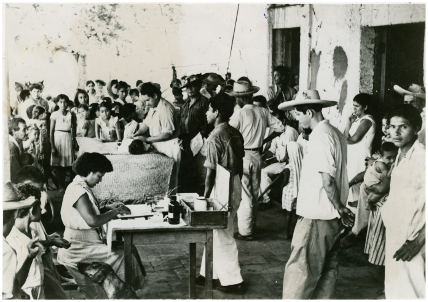
Malaria Control, Guerrero, Mexico. From the 1950 Annual Field Report #38.
Image courtesy of the Rockefeller Archive Center
There are many ways to participate in the Consortium's activities helping produce new knowledge in the history of science, technology and medicine, and providing historical perspectives on contemporary issues in these fields. Our activities fall into three categories: fellowships for researchers; events for scholars and for the public; and online resources for research, teaching and learning. Now in its tenth year, the Consortium has a robust fellowship program, a lively program of academic events and a rich website. While we continue our efforts to make these programs larger, more effective and more efficient, we are focused especially on building our public events program.
This newletter reports on our recent activities. If you are already participating, please send us your comments and suggestions. If you have not yet joined in, we hope to see you soon!
|
| Fellowships |
Research Reports
|

|
Lawrence Kessler, Temple University
2015-2016 Dissertation Writing Fellow
Planter's Paradise: Nature and Culture on Hawai'i's Sugarcane Plantations.
|

|
Tamara Kneese, NYU
2015-2016 Research Fellow
Digital Afterlives: Patterning Posterity through Networked Remains.
|

|
Joseph Malherek, George Washington University
2015-2016 NEH Postdoctoral Fellow
From Bauhaus to Maxwell House: Continental Design and Social Science as Technologies of Consumer Engineering in Twentieth-Century America.
|

|
Lisa Ruth Rand, University of Pennsylvania
2015-2016 Dissertation Writing Fellow
Orbital Decay: Space Junk and the Environmental History of Earth's Borderlands, 1957-1985.
|

|
Carolyn Roberts, Harvard University
2015-2016 Dissertation Writing Fellow
Apothecary, Surgeon, Doctress, Slave: African and European Medicine in the British Slave Trade.
|

|
Dora Vargha, University of Exeter
2015-2016 Research Fellow
Road to Eradication: Global Polio Vaccine Testing in the Cold War.
|
Fellows Updates
|
Here are some of the ways that the Consortium's past and current fellows are contributing to the field:
|

|
Nicole Belolan
2014-2015 Research Fellow
Nicole has accepted a position at Rowan University as the Megan Giordano Fellow in Public History and the Curator at Redbank Battlefield and the Whitall House in Gloucester County, NJ.
|

|
Anna Geltzer
2009-2010 Dissertation Writing Fellow
Anna is now the Assistant Director for Education at the Reilly Center for Science, Technology, and Values at the University of Notre Dame, where she directs the undergraduate programs and serves as an executive director of the graduate programs. Anna also published "Stagnant Science: Planning and Coordination of Biomedical Research in the Brezhnev Era" in Artemy Kalinovsky and Dina Fineberg, eds. Reconsidering Stagnation (Lexington Books, 2015).
|

|
Abe Gibson
2014-2015 Postdoctoral Fellow
Abe was recently hired as Lecturer in the School of Historical, Philosophical, and Religious Studies at Arizona State University. Abe's first book, Feral Animals in the American South, was published by Cambridge University Press on August 31, 2016.
|

|
Christopher Heaney
2011-2012 Research Fellow
Christopher is now Assistant Professor of Modern Latin American History at Penn State and the 2016-2018 Barra Post-Doctoral Fellow at the McNeil Center for Early American Studies at the University of Pennsylvania.
|

|
Lawrence Kessler
2015-2016 Dissertation Writing Fellow
Lawrence is now Postdoctoral Fellow-in-Residence and Program Coordinator at the Consortium. He was awarded the 2016 W. Turrentine Jackson article award from the American Historical Association's Pacific Coast Branch for the article "A Plantation upon a Hill; Or, Sugar without Rum: Hawai'i's Missionaries and the Founding of the Sugarcane Plantation System," Pacific Historical Review (May 2015, vol. 84, no. 2). Lawrence was also awarded the 2016 Dr. J. Barnes award for best history dissertation from Temple University.
|

|
Joseph Martin
2011-2012 Dissertation Writing Fellow, 2016-2017 NSF Fellow
Joseph has returned to the Consortium in 2016-17 as an NSF Research Scholar. In February 2016 he published an article in Physics Today, "The Peaceful Atom Comes to Campus," about the Michigan Memorial-Phoenix Project, a post-World War II nuclear research program at the University of Michigan that doubled as a war memorial. A special issue of Historical Studies in the Natural Sciences on new directions for history of the physical sciences, which Joseph co-edited with Amy Fisher, also appeared in June of this year.
|
|
| Events |
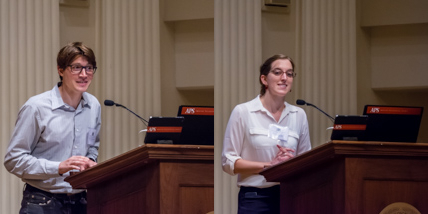
Felix Rietmann of Princeton University and Rosanna Dent of UPenn presenting their work at the Annual Introductory Symposium, held at the American Philosophical Society.
About 40 people joined us for the sixth Annual Introductory Symposium and nearly 400 people from around the world watched the live stream online. In addition to 21 scholars presenting their work, representatives from the Newberry Library in Chicago and the NY Academy of Medicine provided an overview of the research opportunities available at their institutions. As is the normal practice in these events, we had many short talks with long coffee breaks for discussion as well as lunch and an afternoon reception. It is a great way to start the academic year.
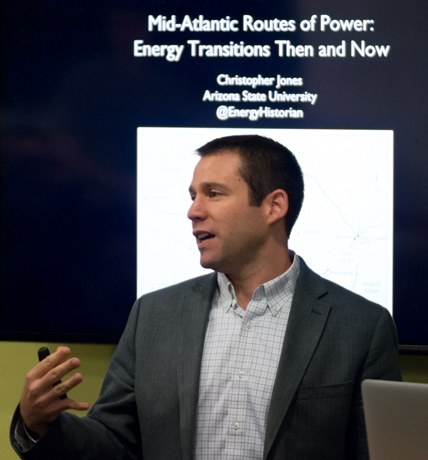
Christopher Jones of Arizona State University speaking at Drexel University
Christopher Jones, a former Consortium Research Fellow and currently Assistant Professor at Arizona State University, delivered the keynote at the Philadelphia Energy Futures Summit. The lecture and workshop were organized by the STS Program at Drexel University. He spoke on November 15th about the development of America's first fossil-fuel intensive region, the mid-Atlantic, explaining the critical roles played by transportation infrastructure in creating new energy consumption patterns. He also discussed the lessons his work might have for the development of renewal energy sources.
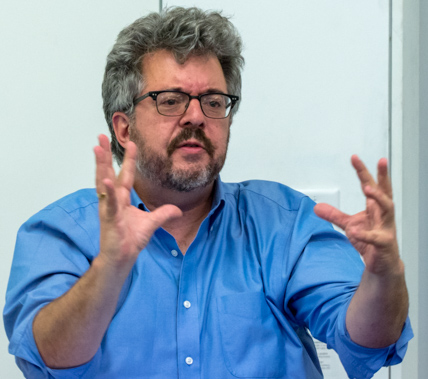
Lawrence Cohen of UC Berkeley speaking at UPenn.
The following day, Lawrence Cohen, of UC Berkeley, delivered a lecture to launch a workshop at UPenn on New Approaches to STEM in South Asia. He examined efforts in India to produce a national biometric ID and how these efforts interact with different notions of identity, history, privacy and religion in India. This lecture and the workshop were sponsored by the South Asia Forum at UPenn.
|
Working Groups |
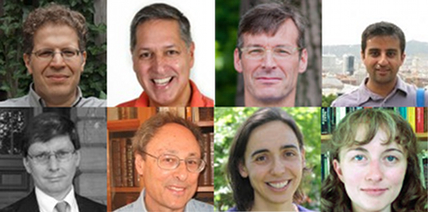
Top: Jamie Cohen-Cole, Greg Eghigian, Darin Hayton, Nahyan Fancy
Bottom: Peter Dear, Bob Westman, Ramah McKay, and Mary Brazelton
The Consortium launched new working groups this year and welcomed new conveners. Jamie Cohen-Cole of George Washington University and Greg Eghigian of Penn State have relaunched the working group on the history of the Human Sciences, which meets on third Wednesdays. The group formerly known as the Early Sciences Working Group has split into two groups. One, the working group on the history of ancient and medieval sciences meets on second Thursdays and is run by Darin Hayton of Haverford College and Nahyan Fancy of DePauw. The other, the working group on the history of early modern science is run by Robert Westman of UCSD and Peter Dear of Cornell. The Science Beyond the West group has two new conveners, Ramah McKay of UPenn and Mary Brazelton of Cambridge University, who have joined Projit Mukharji of UPenn. Frederick Davis of Purdue University is beaming in from Hong Kong to join Jeremy Vetter of the University of Arizona to run the Earth and Environmental Sciences working group. More information on the 11 working groups and 24 co-conveners is available on the working groups' webpage.
As in previous years, scholars participate in the working groups in person or online. This year, two workshops were opened to working group participation. The first was a symposium hosted at the University of Minnesota. Titled “Beyond the Scientific Revolution,” this symposium will result in the publication of a special issue of the Journal of Early Modern History. The working group used the Consortium’s web-conferencing platform to join remote participants from across the country, doubling the symposium’s attendance. The second symposium was hosted by the South Asia Center at UPenn and was titled “New Approaches to STEM in South Asia.” We look forward to offering more online workshops for working group participants.
|
| Collections |
The Chemical Heritage Foundation is pleased to announce that the newly processed Spinco Historical Collection is now open to researchers. Founded in 1946, Spinco is a noted American manufacturer of scientific and medical instruments. The firm is best known for making centrifuges, but its product line has also featured a number of other innovative instruments, including electrophoresis systems, amino acid analyzers, and protein peptide sequencers. Materials preserved in the Spinco Historical Collection include printed materials, photographic materials, business records, and audio-visual materials.
The The Kislak Center for Special Collections, Rare Books and Manuscripts, University of Pennsylvania received a donation of one hundred and eight books on the subject of natural history and medicine, dating from the sixteenth to the twentieth centuries and including works by Dr. Martin Lister (1638?-1712), Royal Physician to Queen Anne. The Kislak Center received another gift of a collection of over one thousand works of science fiction from the 1940s to the 2000s. The center also acquired documents relating to editing the Annales de Chimie, of which Louis-Bernard Guyton de Morveau (1737-1816) was the lead editor, along with Lavoisier and others, from its inception in 1789.
The New York Academy of Medicine Library recently acquired the Bodyscope (1948), an unusual and entertaining addition to the library’s collection of books with movable parts. The Bodyscope was prepared by Ralph H. Segal and Theodore I. Segal, with illustrations by William Brown McNett, the Director of Medical Arts at the Temple University School of Medicine. The library has also acquired Juan Bautista Juannini’s (1636-1691) Carta escrita al muy noble Aretino, el doctor Don Francisco Redi, medico archiatro de S.A. Serenissima el Gran Duque de Toscana, a rare work on the nervous system published in 1689. The library also recently completed cataloging 42 medical student notebook manuscripts kept by students studying at medical colleges in New York between 1827 and 1909.
|
| Previous Newsletters |
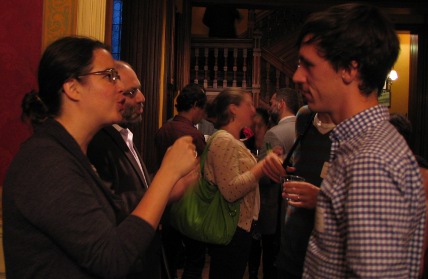
Several Princetonians during a break in the 2012 Annual Introductory Symposium.
| |

Home
Events
Fellowships
Collections
Groups
Contact
|
|